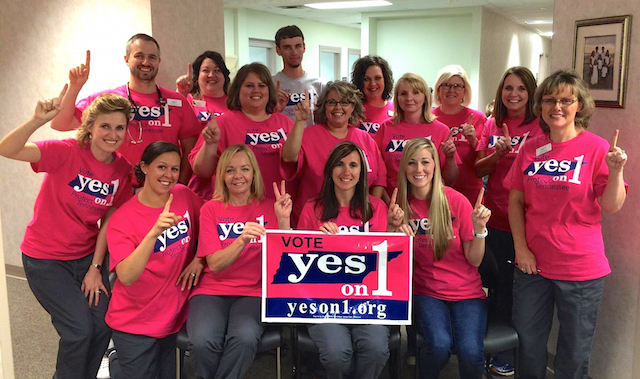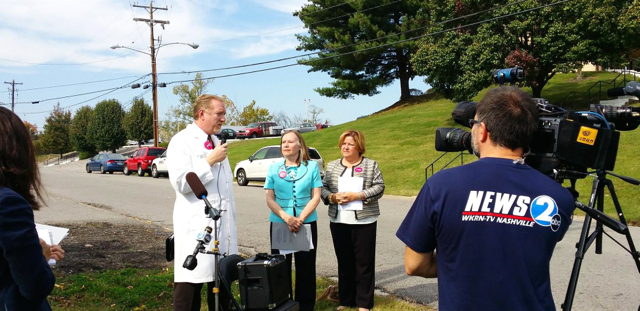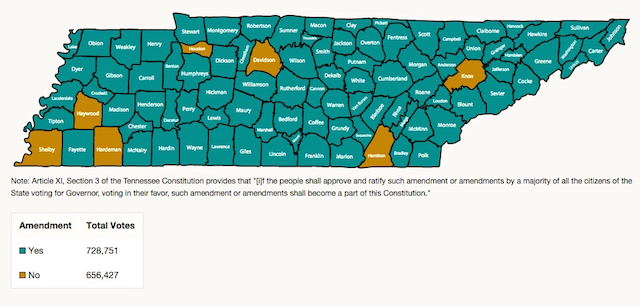NASHVILLE, Tennessee — This week saw landmark pro-life activity in the Tennessee State Legislature, as two bills were passed overwhelmingly in the House – having previously passed with large majorities in the Senate. Both bills are now on their way to Governor Bill Haslam (R), expected to sign them into law.
These bills will implement informed consent, a 48-hour waiting period (after a woman receives the information), and requiring that abortion facilities performing 50 abortions per year be licensed and inspected by the State Department of Health.

Tennessee Gov. Bill Haslam meets with a local scout troop (Photo: Nick Smith / Flickr)
While only a first step to protect women and save pre-born lives in Tennessee, these laws represent the culmination of a tireless 14-year effort by pro-life advocates to reverse a dangerous, even deadly policy put in place through a court ruling.
Tennessee used to have these protections before being hit with a lawsuit by Planned Parenthood and the ACLU. They sued to remove three regulations around abortion that had been voted into place by legislators of both parties: informed consent, 48-hour waiting period, and that late-term abortions must be done in hospital settings.
On September 15, 2000, the Tennessee Supreme Court decided in favor of Planned Parenthood; with this decision, the justices found a broad “right to abortion” in our State Constitution. Their decision prevented any regulation of abortion providers from being enforced that could not pass a strict scrutiny standard.

A court decision in Tennessee blocked pro-life legislation for 14 years (Photo: Jake Brewer / Flickr)
This decision emboldened an abortionist operating two facilities to sue when the Department of Health tried to inspect the centers and demand that he meet the standards of same-day surgery centers. He prevailed in court by saying he was operating under a doctor’s office license and did not have to meet these regulations unless he performed a substantial number of abortions.
The court did not define what constitutes a substantial number; left unanswered, he was free to operate using this loophole. Others followed suit. As a result, Tennessee became known as the “abortion mecca of the southeast” and ranked as the third state nationally for out-of-state women coming to get their abortions.
The dissenting judge from the 2000 decision advised the only remedy for the people was to enact an amendment to the State Constitution, stating that it was silent on the issue of abortion – allowing the people to once again speak through their elected legislators to enact regulations around abortions.

Volunteers in every one of Tennessee’s 95 counties engaged in the Yes on 1 effort (Photo: Yes on 1)
Amending the State Constitution is an arduous process. It must pass the General Assembly by a simple majority, followed by a super majority, appear on the ballot in a year that a Governor is elected and pass by at least 50 percent plus one (of the number of votes cast for Governor).
It took 14 years of pro-life advocacy for this measure, Amendment 1, to be on the 2014 ballot. Along the way, it was essential for the pro-life issue to be front and center in elections – changing the political landscape dramatically. The battle to pass this state measure received national attention.
The grassroots coalition “Yes on 1” was outspent 3 to 1, and all four major city newspapers endorsed the Planned Parenthood position. Funded by out-of-state pro-abortion interests, the “No on 1” campaign even produced what was named “the most dishonest TV ad of the 2014 election season.”
November 4, 2014 was the moment of truth. The pro-life Amendment 1 relied upon a strong grassroots effort in all 95 counties to win 53% to 47% in Tennessee.

Dr. Brent Boles speaks at a Yes on 1 press conference in Nashville (Photo: Yes on 1 / Facebook)
While the measure lost in Tennessee’s four large cities, rural areas like Murfreesboro – where pastors were unafraid to speak out on social issues – carried the measure to victory. Brent Boles, an OB-GYN who practices in Murfreesboro, offered his medical expertise to the “Yes on 1” effort as a volunteer spokesman.
The improbable grassroots victory didn’t go unnoticed. Statewide Associated Press reporters named the passage of Amendment 1 as the “Story of the Year” in Tennessee – where America at Its Best is the official state slogan.
The first legislative session since Amendment 1 began in January 2015, and this week’s landmark passage of these three protections was celebrated by many. “Tennessee Right to Life thanks the people of Tennessee who supported Amendment 1 and the many legislative sponsors and supporters of these bills to protect the health and safety of women and girls,” said Brian Harris, the organization’s president.

The majority of TN counties voted yes on 1; the pro-abortion coalition won only urban areas
“Children will now be given a better chance at life because their mothers and families had the extra time and opportunity to make fully informed decisions,” he continued.
Today’s losers? “Those who profit from unregulated abortion in Tennessee,” said Harris. And the winners? “Women, girls and families are empowered by the requirement that adequate and accurate information is provided to assure careful decisions to protect health and life in our state.”
Reprinted with permission of Bound4LIFE.






